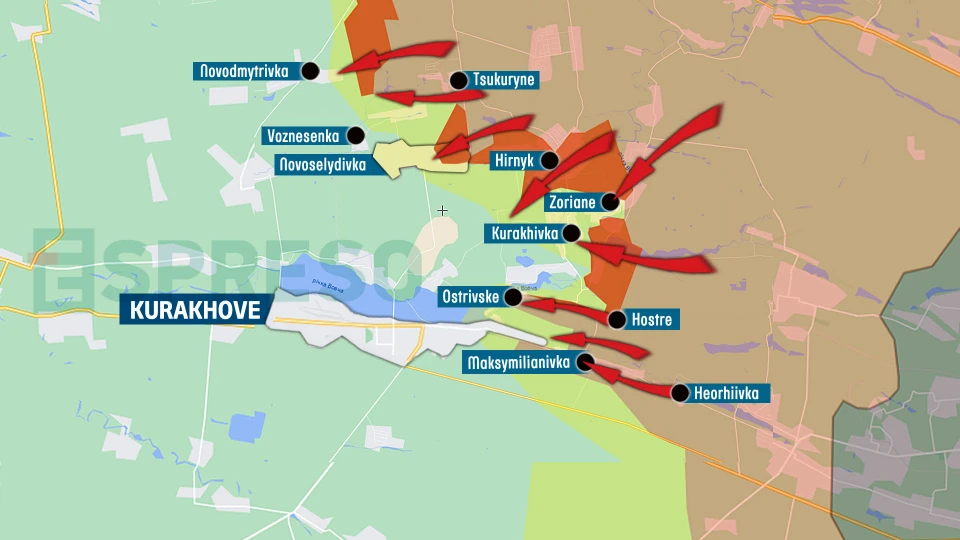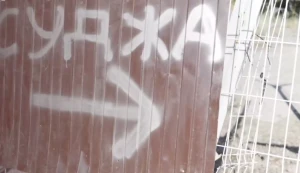
Weak fortifications on Kurakhove front and revival of Ukraine’s EW industry. Serhiy Zgurets' column
OSINT analysts report a lack of reliable fortifications in the Kurakhove direction, which could hinder the Ukrainian Defense Forces' efforts to repel Russian advances
Russian troops keep trying to advance towards Kurakhove
The Kurakhove and Pokrovsk directions remain the hottest today. According to the Ukrainian General Staff's reports, the number of combat clashes in these areas is half of the total for the day. In the Pokrovsk direction, Russian forces are trying to break through to Kurakhove, which is the largest transportation hub for the Ukrainian army in the southern part of Donbas. After capturing Selydove and Hirnyk, Russian forces are storming the village of Kurakhivka and the entire line of villages from Selydove to the Kurakhivka water reservoir. Ukrainian troops continue to fight to retreat to the west of the Kurakhivka reservoir. Kurakhove is located behind this reservoir. According to various versions, there are several options for Russian actions in this area. In particular, they will try to move towards Kurakhove from the south. Following a series of attacks on Ukrainian settlements, Russian forces are attempting to move north. We know that they have advanced to the village of Yasna Poliana, located north of Shevchenkove. In just five days, this advance has reached within 8 kilometers. The main development is that Russian forces are not advancing toward Kurakhove, but rather toward the road leading to the settlement of Andriivka. It is believed that if they succeed in this advance, they could cut off the logistics of the highway supplying Kurakhove, thereby attempting to avoid a series of frontal assaults on the city.

Map of hostilities in the Kurakhove direction as of October 30
The distance from Yasna Poliana to the road leading to Kurakhove is over 14 km. According to OSINT analysts, there are no reliable fortifications between Andriivka and Shevchenkove; the area consists of open fields and forest strips without fortified lines. Nevertheless, Ukrainian troops continue to carry out defensive tasks. The lack of fortifications could significantly impact the pace of the Russian advance. The enemy continues to employ artillery, aviation, and small assault groups to push forward in the Kurakhove direction. Ukrainian brigades in this area are becoming exhausted and are not always adequately supplied with ammunition, which affects the sustainability of the defense. Therefore, the Ukrainian General Staff must seek ways to impede the Russian advance.
Electronic industry development in Ukraine
Yaroslav Kalinin, Director of the Infozahyst Research and Production Center, is engaged in the development of tools that allow obtaining information about the enemy. In particular, the creation of radio reconnaissance and radio engineering intelligence. The company also develops electronic countermeasures. Kalinin noted that a landmark event has taken place in the Ukrainian electronics industry that will significantly strengthen Ukrainian Defense Forces. However, the information is classified so as not to give it away to the enemy.
Yaroslav Kalinin said that today the company is actively searching for means to detect and warn of Russian reconnaissance UAVs. Unmanned aerial vehicles are the backbone of the Russian intelligence system on the front line. Today, most industries in Ukraine are looking for solutions to counter reconnaissance drones. According to Kalinin, active work is also underway to maintain the equipment that Ukraine's partners have provided it with. In particular, we are talking about electronic warfare equipment. Yaroslav Kalinin emphasized that an important area of the company's work is establishing partnerships and strategic alliances that study the experience of combat operations in Ukraine. These programs have developments that allow Ukraine to be effective on the battlefield. Kalinin noted that all these trends have been observed for a year.
Yaroslav Kalinin said that today Ukraine is actually resuscitating the electronic industry. The number of companies that create fairly high-quality electronic warfare equipment is growing. Kalinin also noted that the permission to export the remnants of such means will lead to a qualitative growth of expertise and the creation of a separate powerful area of the domestic defense industry. In particular, the creation of new technological models. This will create high demand at the level of institutes and universities, which is a great sign for the defense industry.
Exports of defense products should be allowed
Yaroslav Kalinin believes that if there is no government contract for the production of munitions and there are certain surpluses in the company's warehouses, then of course exports should be allowed. If the state prohibits the export of military munitions, it should sign contracts with manufacturing companies. The terms of such contracts may be different, but there should be contracts. Kalinin noted that the state should provide for the Armed Forces and formulate the needs of the army. For a long time in Ukraine, the relationship between the public and private sectors and the monopoly customer has been incorrectly balanced. This leads to the fact that there are weapons in warehouses, but they are not purchased by the state. It would be logical to export it. Moreover, the state is not able to buy all the weapons produced by companies, as the capacity of such manufacturers has increased significantly during the war. The only prohibition on the export of military munitions should be the existence of an unfulfilled defense contract with the state.
According to Yaroslav Kalinin, the export of military goods is not actually banned. The head of the State Export Control Service has explicitly stated that Ukraine does not export much military equipment, as there is no direct prohibition in place. Kalinin noted that there is a presumption of denial regarding certain activities in Ukraine today. Furthermore, if the Ministry of Defense refuses to export specific munitions, it should reference that if the munitions are codified but no contract exists, there are no substantial grounds for refusal.
Kalinin also said that Infozahyst plans to submit its first export applications for the export of surplus products. He noted that the company's products have a number of international codifications and certificates, and therefore it is very easy for the company's representatives to communicate at the level of contracting Ramstein countries. Smaller companies will have a harder time promoting their products on the international market because this process requires a certain quality control system and standardization. However, as Kalinin noted, this process needs to be started. Only then will there be demand.
- News












































